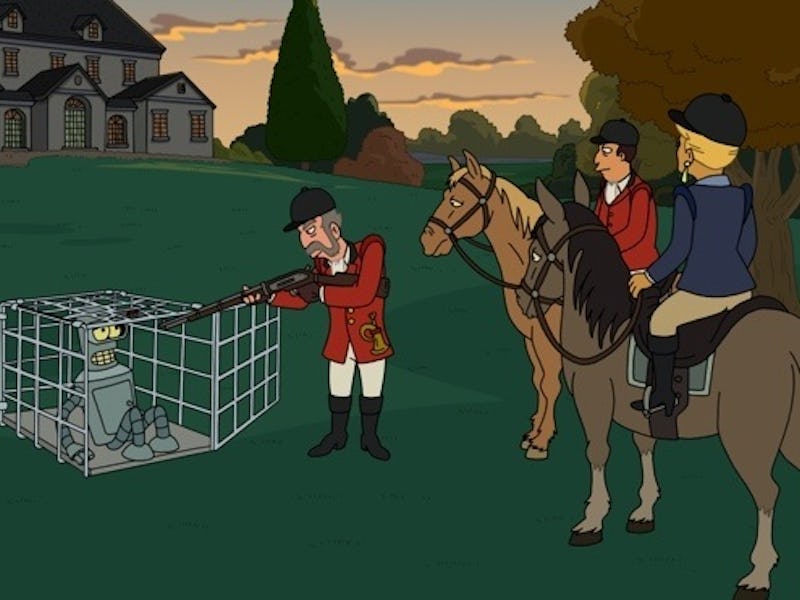Robot Hunting Is the Inevitable, Superior Replacement for Animal Hunting
It's not about leveling the playing field, just making it consistent and reusable.

In our mass market dystopias, the fictional love children of Ms. Terminator and Mr. Smith hunt us. But, in reality, robots have the lower hand. So why don’t we hunt them? After all, it would be more humane than killing animals for sport — at least until artificial intelligence takes a giant leap forward. It looks like 2016 will be the year of million-dollar drone racing leagues and driverless car grand prixes and maybe giant mecha-battles, so why not embrace next-gen barbarism?
It turns out, there are a few regulatory and logistical issues standing in the way. But not many.
So you want people to what, shoot a flock of autonomous drones out of the sky?
Well, no. Not other people’s drones, which is a felony in most places. (Even that Kentucky judge who allowed it, only did so in cases of trespassing.) You could still shoot your own, but it turns out that quadcopters are a really tough target, and going after one half-cocked in the backyard with a .22 is not a smart strategy if you value your belongings or your neighbors.
Then what are you going to shoot?
There’s an offshoot of skeet shooting, called helice, where you try to shoot clay pigeons with propellers strapped to them. The propellers force the clay pigeons to move in erratic trajectories. It’s pretty popular in Britain.
Robot hunting could be something like that. But as it stands now the expense is prohibitive. A clay pigeon costs a dollar or less; no quadcopter is that cheap. Until we can make a cheap, more durable drone, aerial hunting is out.
So what are you proposing?
Shooting Spot — or a cheaper, but similarly shaped, machine. For reference, Spot is the robot on the left:
Oh, goddam you. That thing’s adorable.
Yeah, I mean, I think so too, but it’s meant for military applications, has no feelings, and is a machine. I also don’t mean Boston Dynamics’ Spot, which is likely the result of more DARPA funding than a hobby could support.
The idea being to go after animal-shaped machines that can take some pellets or even paintballs and recover.
Who is going to do this?
Recreational hunters who aren’t killing deer (there are too many on the East Coast and it’s deeply problematic). Robot hunting offers a feasible alternative for people who like to stalk animals, but don’t necessarily want to mount heads on a wall. It’s a bit of a pipe dream, of course, because of the expense, but consider that big-game hunters drop millions to chase big mammals and it starts to sound less ridiculous. With that, you could make a pretty sweet grizzly bear robot.
For even less money, you could make and deploy a reusable target robot. Hell, you could even strip out the automation and remotely control the prey. This becomes the techno-optimist version of the least dangerous game: One person gets a gun, the other person a first-person camera, headset, and a 5-minute head start. The robot is off, barreling through the woods with the hunter in pursuit. There won’t be droppings to follow, but it feels like a small prize to pay for creating a head-to-head hunting competition.
And, sure, you could create a detachable head perfect for above the mantle.
Will this happen?
It’s less improbable than it sounds. In order to make robot fighting or drone racing cost effective, those sports organizers have stressed creating reusable and reparable bots. It doesn’t make sense to build a pride of huntable mecha-lions, but it does make sense to build one — and history is full of hunters who set off in pursuit of specific famous beasts.
The real problem here is cultural. Hunting is — on some level — about mastery of nature. Robot hunting wouldn’t be because it would necessarily be contrived. That said, we’re not exactly rolling around in wilderness anymore. Many shoots are already contrived. Many bird hunters, in particular, bring their own game then track it. Is that different? Not from a practical standpoint — though one imagines it’s worst for the bird.
Are guns really necessary?
Not as such, because installing sensors would be easy, but let’s take this thing slowly alright?